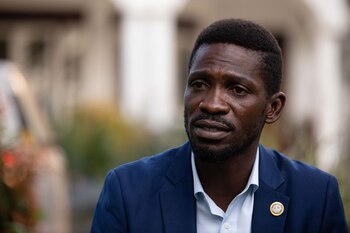
(Bloomberg) --
Ugandan President Yoweri Museveni looks set to clinch a sixth straight election victory, with preliminary results showed he trounced his nearest rival -- whose party is disputing the initial count.
With 9.3 million ballots tallied from 86% of polling stations, Museveni garnered 59% support, and pop star-turned-politician Bobi Wine 35%, the Electoral Commission of Uganda said on state television on Saturday. The nation has 18.1 million registered voters out of a population of about 45 million.
Wine, 38, whose real name is Robert Kyagulanyi and who became a lawmaker in 2017, presented himself as a youthful alternative to the 76-year-old Museveni -- who came to power in a coup in 1986. The campaign was marred by violence and opposition allegations that the government was trying to rig the outcome in favor of the incumbent.
Own Count
Final results are expected to be announced later on Saturday.
Wine’s National Unity Platform rejected the initial results. The party is keeping its own tally based on announcements made at polling stations around the country, spokesman Joel Ssenyonyi said.
“Let him show the country in what manner and what form the results are rigged,” the electoral body’s chairman, Simon Byabakama, told reporters in the capital, Kampala.
Wine said in a Twitter posting on Friday that members of the military had scaled his fence and seized control of his home.
‘Serious trouble’
“None of these military intruders is talking to us,” he said. “We are in serious trouble. We are under siege.”
It was unclear whether Wine had been physically harmed, his lawyer Robert Amsterdam said by phone.
“Let’s be clear, this is not a free and fair election. This is a situation where Museveni is attempting to legitimize a dictatorship, Amsterdam said. “There is no Museveni win. That’s already clear from the polls that he’s lost.”
Museveni is one of Africa’s longest-serving rulers. He retains strong support in rural areas, and wields strong influence over the state -- a major advantage in a nation that has long been dogged by electoral disputes.
Military Patrols
At least 54 people died after protests erupted in November following Wine’s arrest. Police and soldiers have used armored personnel carriers to patrol the capital in operations they said were aimed at thwarting election-related violence.
Ugandans also had to contend with an internet shutdown after authorities directed telecommunications operators to switch it off. That and the failure of the electoral body to accredit observers from diplomatic mission could put the integrity of the Jan. 14 vote into question.
Uganda is Africa’s biggest-coffee exporter and plans to start producing oil by 2024.
Últimas Noticias
Debanhi Escobar: they secured the motel where she was found lifeless in a cistern

The oldest person in the world died at the age of 119

Macabre find in CDMX: they left a body bagged and tied in a taxi
The eagles of America will face Manchester City in a duel of legends. Here are the details

Why is it good to bring dogs out to know the world when they are puppies




